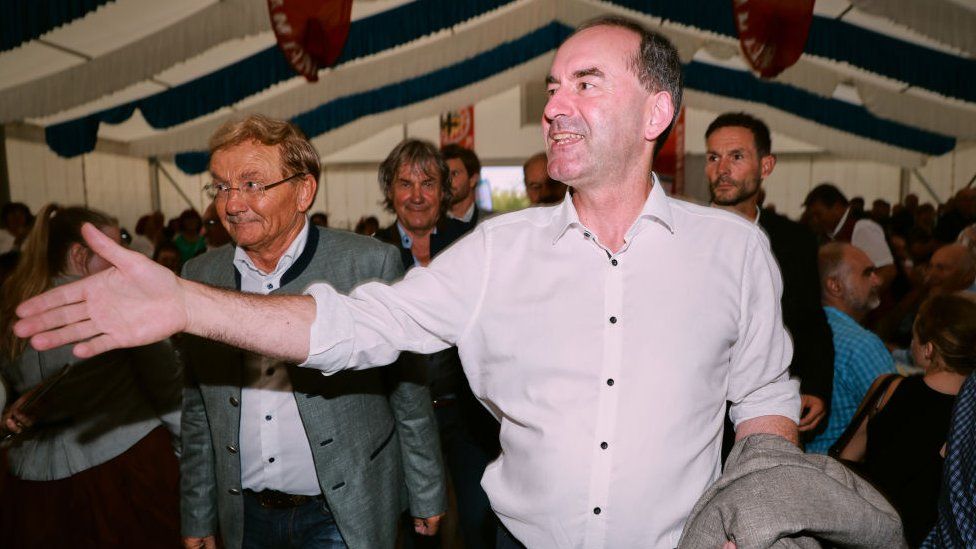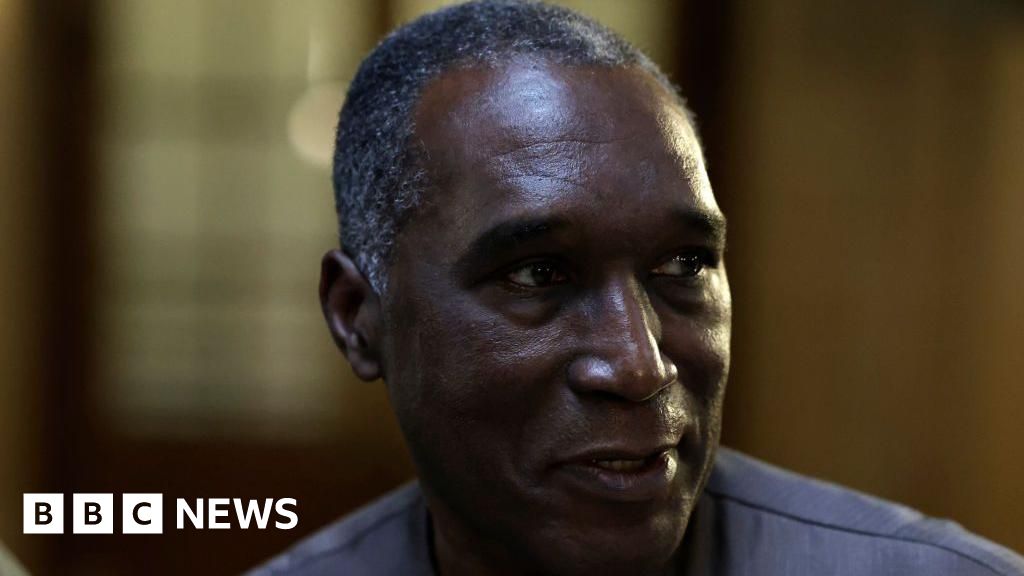ARTICLE AD BOX
 Image source, Johannes Simon/Getty Images
Image source, Johannes Simon/Getty Images
Hubert Aiwanger has a fiery, populist style but is not known for anti-Semitic views
By Damien McGuinness in Berlin & Paul Kirby in London
BBC News
The deputy premier of the German state of Bavaria, Hubert Aiwanger, has been asked to explain his role in a schoolboy anti-Semitic pamphlet.
The populist conservative leader denies writing the Auschwitz pamphlet which mocked the Holocaust but he has admitted having it 35 years ago.
Conservative Premier Markus Söder has asked Mr Aiwanger to reply to 25 questions on the controversy.
Bavaria holds key elections on 8 October.
Mr Söder met the leader of his coalition partner, Freie Wähler (Free Voters), on Tuesday and called for full transparency.
He said there was "no place for anti-Semitism in the Bavarian government".
The state parliament has demanded an emergency statement.
German Chancellor Olaf Scholz has called for clarification too, after the newspaper revelations of Mr Aiwanger's schoolboy activities emerged at the weekend in the left-leaning Süddeutsche Zeitung.
The general secretary of the chancellor's centre-left party, Kevin Kühnert, made clear when Germans talked about anti-Semitism it required "utmost vigilance and nobody should have a tactical relationship with it".
When the story of the leaflet first broke, Mr Aiwanger's initial reaction was to claim it was just a politically motivated media campaign against him. Then he simply denied writing it, saying it was someone else.
The typewritten pamphlet talked of a fictitious competition to find "who is the biggest traitor to the Fatherland", with a first prize of a "free flight through the chimney in Auschwitz".
The Auschwitz extermination camp was at the heart of the Nazi genocide of six million Jews in World War Two. Of 1.1 million people murdered at Auschwitz, about a million were Jews.
The deputy premier later admitted that "one or several" copies of the leaflet were in his schoolbag in Mallersdorf-Pfaffenberg in Lower Bavaria when he was a teenager in the late 1980s. He appeared unable to remember if he had distributed the anti-Semitic material himself but said he found the contents "disgusting and inhumane".
Image source, Johannes Simon/Getty Images
Image caption,Premier Markus Söder (R) has not asked his deputy to resign but the row comes at the worst time for him ahead of elections
His brother, Helmut Aiwanger, said he had written the pamphlet when he was still a boy and now regretted his actions. "I was totally furious at the time as I'd failed school and was torn apart from my circle of friends."
Apart from vague speculation from Helmut Aiwanger that his brother was "possibly" trying to gather up the leaflets to minimise harm, it is still unclear why the leaflets were in the schoolboy's bag. No information about the subsequent school disciplinary procedure has been released.
Many of Germany's newspapers are asking whether the immature, schoolboy scribblings of a teenager's brother should bring down a politician decades later. But there is universal agreement the pamphlet's content is far from trivial.
Making jokes about concentration camps is out of bounds even for the far right and can have legal ramifications in Germany, where denying the Holocaust is a crime.
Ordinarily Mr Aiwanger is eloquent and known for his fiery, populist style but in this case he has stayed tight-lipped, answering questions at one press conference simply with a brusque "next question". This has not left anyone with an impression of full disclosure or repentance.
He is not known for expressing anti-Semitic views but he has flirted with rhetoric reminiscent of the far-right Alternative for Germany (AfD), including talk of "taking back our country".
He is now under pressure from Bavaria's premier to respond to a situation that appears to be spiralling out of control.
Mr Söder says he wants to remain in coalition with Mr Aiwanger's party but he is evidently furious this row has blown up so soon before key elections. At a beer-hall election rally in Bavaria he made snide jokes clearly aimed at Mr Aiwanger.
Free Voters are set to win 11-14% of the vote in six weeks' time but if their support implodes Mr Söder's conservative Christian Social Unionwould be in trouble.
The Bavarian leader's ambitions for one day taking on the role of German chancellor are already being dashed by poor poll numbers. Without Free Voters his party would have the tricky task of trying to win over the left-leaning Green Party, a hate figure for many Bavarian conservatives.
With key votes in eastern German states next year and national elections in 2025, what happens in Bavaria in October's election will have a big impact in German politics.
The AfD has reached record poll numbers of more than 20% across Germany, and the conservatives in Bavaria have a difficult balancing act.
If they stray too far into nationalist territory, as some believe Mr Aiwanger has done, centrist voters will be scared off. But many right-wingers in Bavaria clearly believe they can fight off the AfD by mimicking its far-right rhetoric.
While the political future of the Free Voters leader has come in for scrutiny, so too has the newspaper's handling of the story.
In its headline, Süddeutsche Zeitung's website reported that the deputy premier was said to have written the pamphlet, although his denial was only carried behind a paywall for subscribers to see it.

 1 year ago
35
1 year ago
35








 English (US)
English (US)